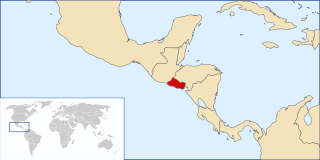ONUCA was a United Nations peacekeeping mission deployed in Central America in 1990 and 1991.

United Nations Security Council Resolution 650 was adopted unanimously on 27 March 1990. After recalling resolutions 637 (1989) and 644 (1989), the Security Council endorsed the report by the Secretary-General and decided to authorise an enlargement of the United Nations Observer Group in Central America (ONUCA) in order to demobilise the Contras in Nicaragua.

United Nations Security Council resolution 653, adopted unanimously on 20 April 1990, after recalling resolutions 644 (1989) and 650 (1990), the council endorsed a report by the Secretary-General and authorised new additions to the mandate of the United Nations Observer Group in Central America.

United Nations Security Council resolution 656, adopted unanimously on 8 June 1990, after recalling Resolution 654 (1990) and reviewing a report by the Secretary-General, the council decided to extend the tasks of monitoring the ceasefire, demobilising and separating the Contras and other forces of the resistance in Nicaragua until 29 June 1990.

United Nations Security Council resolution 675, adopted unanimously on 5 November 1990, after recalling resolutions 637 (1989) and 644 (1989), the Council endorsed a report by the Secretary-General and decided to extend the mandate of the United Nations Observer Group in Central America for a further six months until 7 May 1991.

United Nations Security Council resolution 691, adopted unanimously on 6 May 1991, after recalling resolutions 637 (1989), 644 (1989) and 675 (1990), the Council endorsed a report by the Secretary-General and decided to extend the mandate of the United Nations Observer Group in Central America for a further six months until 7 November 1991.

United Nations Security Council resolution 693 of 20 May 1991 established the United Nations Observer Mission in El Salvador to verify the military-led government of El Salvador and the militia Farabundo Martí National Liberation Front's compliance with human rights in accordance with an agreement both parties signed in San Jose in 1990.

United Nations Security Council resolution 719, adopted unanimously on 6 November 1991, after recalling resolutions 637 (1989), 644 (1989), 675 (1990) and 691 (1991), the Council endorsed a report by the Secretary-General and decided to extend the mandate of the United Nations Observer Group in Central America for a further five months and twenty-three days until 30 April 1992.

United Nations Security Council resolution 729, adopted unanimously on 14 January 1992, after recalling resolutions 637 (1989), 693 (1991) and 714 (1991), the Council welcomed the conclusion of agreements by the Government of El Salvador and the Farabundo Martí National Liberation Front to bring about an end to the ongoing civil war in El Salvador and the Secretary-General's intention to end the United Nations Observer Mission in El Salvador.

United Nations Security Council resolution 730, adopted unanimously on 16 January 1992, after recalling resolutions 719 (1991) and 729 (1992) the Council approved a report by the Secretary-General from 14 January, and decided to terminate the mandate of the United Nations Observer Group in Central America (ONUCA) with effect from 17 January 1992.

United Nations Security Council resolution 784, adopted unanimously on 30 October 1992, after recalling resolutions 637 (1989), 693 (1991), 714 (1991) and 729 (1992), the council approved a decision by the Secretary-General Boutros Boutros-Ghali to extend the mandate of the United Nations Observer Mission in El Salvador (ONUSAL) for a further month until 30 November 1992.

United Nations Security Council resolution 791, adopted unanimously on 30 November 1992, after recalling resolutions 637 (1989), 693 (1991), 714 (1991), 729 (1992) and 784 (1992), the Council approved a decision by the Secretary-General Boutros Boutros-Ghali to extend the mandate of the United Nations Observer Mission in El Salvador (ONUSAL) for a further six months until 31 May 1993.

United Nations Security Council resolution 832, adopted unanimously on 27 May 1993, after recalling resolutions 637 (1989), 693 (1991), 714 (1991), 729 (1992), 784 (1992) and 791 (1992), the council noted a report by the Secretary-General Boutros Boutros-Ghali and enlarged the mandate of the United Nations Observer Mission in El Salvador (ONUSAL) to include the observation of the electoral process.

United Nations Security Council resolution 882, adopted unanimously on 5 November 1993, after reaffirming resolutions 782 (1992) and subsequent resolutions on Mozambique, the council noted, in addition to positive developments in the country, that some aspects of the Rome General Peace Accords had not been implemented.

United Nations Security Council resolution 888, adopted unanimously on 30 November 1993, after recalling resolutions 637 (1989), 693 (1991), 714 (1991), 729 (1992), 784 (1992), 791 (1992) and 832 (1993), the council expressed concern at aspects of the situation in El Salvador and extended the mandate of the United Nations Observer Mission in El Salvador (ONUSAL) until 31 May 1994.

United Nations Security Council resolution 911, adopted unanimously on 21 April 1994, after reaffirming resolutions 813 (1993), 856 (1993) and 866 (1993), the Council welcomed progress made towards establishing the Liberian National Transitional Government but was concerned about subsequent delays in implementing the Cotonou Peace Agreement, and extended the mandate of the United Nations Observer Mission in Liberia (UNOMIL) until 22 October 1994.
United Nations Security Council resolution 916, adopted unanimously on 5 May 1994, after reaffirming Resolution 782 (1992) and all subsequent resolutions on Mozambique, the council decided to renew the mandate of the United Nations Operation in Mozambique (ONUMOZ) for a final period ending 15 November 1994, and discussed the implementation of the Rome General Peace Accords.
United Nations Security Council resolution 920, adopted unanimously on 26 May 1994, after recalling resolutions 637 (1989), 693 (1991), 714 (1991), 729 (1992), 784 (1992), 791 (1992), 832 (1993), 888 (1993), the council discussed the implementation of peace agreements in El Salvador and extended the mandate of the United Nations Observer Mission in El Salvador (ONUSAL) until 30 November 1994.
United Nations Security Council resolution 950, adopted unanimously on 21 October 1994, after reaffirming resolutions 813 (1993), 856 (1993), 866 (1993) and 911 (1994), the Council noted the deteriorating situation in Liberia and extended the mandate of the United Nations Observer Mission in Liberia (UNOMIL) until 13 January 1995.

United Nations Security Council resolution 961 was adopted unanimously on 23 November 1994, after recalling resolutions 637 (1989), 693 (1991), 714 (1991), 729 (1992), 784 (1992), 791 (1992), 832 (1993), 888 (1993) and 920 (1994), the council discussed the implementation of peace agreements in El Salvador and extended the mandate of the United Nations Observer Mission in El Salvador (ONUSAL) for a final time until 30 April 1995.









